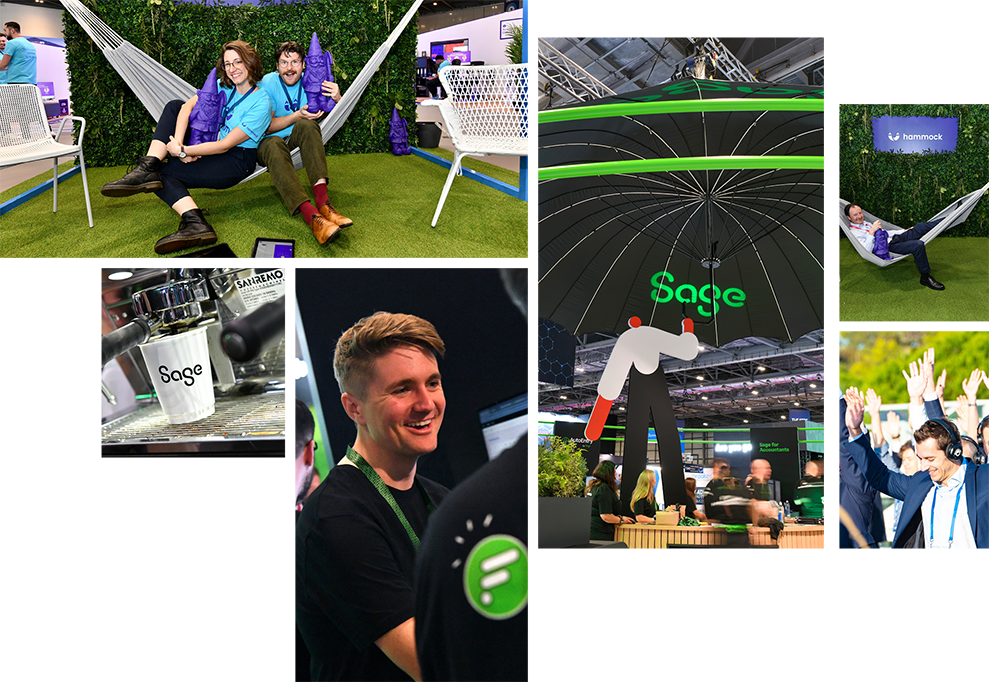Recently, our very own Adam Sherlock, Corey R., and Rebecca Darley shared why the secret sauce to unforgettable events isn’t found in algorithms alone—but in human imagination, playfulness, and creativity.
When you try to narrow down what makes a great event, words like connection, excitement and creativity spring to mind.
But what about fun? When we really gave it some thought, it seemed to us that fun—or more specifically, playfulness—is a crucial yet often overlooked element of what makes an event memorable for all the right reasons. When used well, it has transformative potential, turning a run-of-the-mill experience into something truly unforgettable.
Playfulness can be a powerful tool. But, speaking of powerful tools, how does it fit in with the biggest buzzword on everyone’s lips right now?
We’re talking, of course, about AI.

Birds of a feather?
As a word, ‘play’ is difficult to neatly define precisely because it encompasses so many different activities, contexts and purposes. So, rather than us sit here and try, we’ll go straight to the experts.
Peter Gray, Professor of Psychology at Boston College, argues that ‘play’ has four defining characteristics:
- Play is self-chosen and self-directed.
- Play is intrinsically motivated; means are more valued than ends.
- Play is guided by mental rules.
- Play is always creative and usually imaginative.
It’s easy to see the connections between AI and those first three characteristics in particular:
- AI-powered tools allow us to direct our own creative processes.
- It’s very possible to interact with AI just for the fun of it, rather than for any specific outcome.
- We apply our own mental rules when we use AI; we use strategic prompts and refine our outputs. We also work within the algorithm’s own ‘rules’.
But it’s that fourth point we really want to home in on. Can AI replicate the creativity and imagination of the human brain when it comes to playfulness?
We’d argue that, no, it can’t.
How does all this relate to events?
Back to events—or more specifically, great events. Think back to your last memorable exhibition: Was it the tech alone that made it stand out, or was it something more personal and unexpected? Often, it’s a clever idea dreamed up by someone who understands what genuinely resonates with people.
Take our stand for Sage at Accountex. The idea for our centrepiece (a GIANT umbrella, representing the uniting of their brands under one… well, umbrella) came straight from our very own brains. It was human imagination that sparked the idea, and human graft that delivered a quirky, fun and inviting experience that attendees simply couldn’t resist snapping a picture of.
Sure, we could have used AI to help generate a similar concept, but it’d have been nowhere near as good. Aside from the sheer scale of the thing, it was the subtle human understanding of humour, context and emotional connection that made it such a talking point.
That’s the thing with AI. It supports, but it doesn’t create. At least, not in the same way that we do.
Enhancing, not replacing
What AI does really well is amplify human ideas. It also helps boost efficiency in the planning stages—things like rapid idea generation, fast visualisation, and predictive analytics are invaluable when it comes to streamlining our processes.
Crucially, the more streamlined our processes, the more time we have to push creative boundaries.
It’s a collaborative relationship, not a competitive one. The best event ideas, the ones that spark laughter, delight and connection, will always need a human touch. No amount of algorithmic planning alone can generate the genuine buzz of good, old-fashioned fun.
The future: playful partnerships
So, where does this leave us?
AI undoubtedly offers exciting new possibilities for event planning, helping us refine and execute our playful, creative ideas. But it’s authentic, spontaneous human interactions that create the real power of play at events. While AI is a valuable assistant, it’s never the star of the show.
At Outlook Creative, we believe in playful partnerships—human imagination, supported by smart AI. The future belongs to those who can harness AI’s strengths while never losing sight of what makes events truly unforgettable: creativity and human connection.
After all, you can programme AI, but you can’t programme genuine fun.
Now, excuse me while I go and ask ChatGPT how to fix my boiler.
Feeling inspired? Let’s bring some FUN to your next project. Get in touch to see how we can collaborate.

